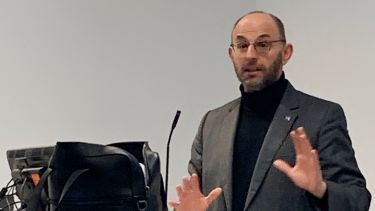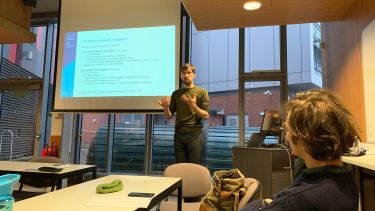The multilingual postion of Brussels was the topic of Prof. dr Wim Vandenbussche's presentation on 27 February. Vandenbussche showed that the position of the Dutch language in Belgium is not simply a linguistic issue: the Flemish movement was a drive towards linguistic, cultural and socio-political equality. In 1893, Dutch and French became equal languages for the law in Belgium. However, Vandenbussche argued and illustrated that in bilingual Brussels, the use of Dutch is slowly being marginalised and, while French remains the dominant language, it is English that is on the rise as the preferred language among the many groups that make up the European capital. Brussels' local government throws its weight behind multilingualism and its awareness and promotion campaign is, perhaps tellingly, named Be Talky.
Wim Vandenbussche's visit was followed by our second visitor Andreas Hiemstra, who spent three weeks in Sheffield to work with our Students of Dutch as part of his doctoral research. He reports on his visit:
"In February/March 2023, I had the pleasure of working with Dr Henriette Louwerse and Dr Filip de Ceuster at the University of Sheffield during a three-week research stay. The research I did in Sheffield was related to my thesis (supervision: Prof. Dr Esther Ruigendijk & Dr Ankelien Schippers, University of Oldenburg & Prof. Dr Marije Michel and Dr Greg Poarch, University of Groningen) for which we were looking for English-speaking learners of Dutch who preferably also have knowledge of German. These are hard to find, but at the University of Sheffield – the university with the most learners of Dutch in the UK – there were plenty.
At Sheffield a total of 22 students took part in a variety of experiments investigating language processing and production of superlatives and verb clusters, as well as the perception of linguistic distance. I also had the opportunity to visit Dr Carol Fehringer at the University of Newcastle and was able to test another 11 students there as part of a student workshop. The first results show that both groups perceive German – not English – as closer related to Dutch.
My thesis focuses on linguistic influence in third language acquisition and more specifically on the question of which language – the first language (German/English) or the second language (English/German) – has a stronger influence on the third language (Dutch). With regard to linguistic influence in third language acquisition, there are a number of models that describe this influence. The Typological Primacy Model (Rothman, 2010) and the L2 Status Factor Hypothesis (Bardel & Falk, 2007) have received the most attention in literature on linguistic influence in third language acquisition to date. Rothman assumes that the language that learners perceive as closer related to the third language (i.e. German in the case of Dutch (e.g. Vismans & Wenzel, 2012)) has a stronger influence on the third language. Bardel and Falk assume that the second language always has a stronger influence on the third language.
My research stay at the University of Sheffield was a great success. Not only was I able to test enough students for my research project, but I also had the opportunity to exchange ideas with other researchers and students about my project.
Andreas Hiemstra
Visiting scholar February-March 2023
In order to test these models, we designed language processing and production experiments with Dutch structures that have two optional variants, where German and English, opposingly, allow only for one.
Superlative:
- …dat de wilde appel de natuurlijkste/meest natuurlijke appel is.
- …dass der wilde Apfel der natürlichste/*meist natürliche Apfel ist.
- …that the wild apple is the *naturalest/most natural apple.
Verb cluster:
- …dat de student gedroomd heeft/heeft gedroomd.
- …dass der Student geträumt hat/*hat geträumt.
- …that the student *dreamed has/has dreamed.
If the Typological Primacy Model describes the influence of the first and second language on the third language best, we should see that English-speaking learners of Dutch (English/German/Dutch) and German-speaking learners of Dutch (German/English/Dutch) use the German equivalents of the superlative and verb cluster more often. However, if the L2 Status Factor Hypothesis describes the influence on the third language best, we should see that English-speaking learners of Dutch use the German equivalents of the superlative and verb cluster more often and that German-speaking learners of Dutch use the English equivalents of the superlative and verb cluster more often.
Both at the University of Sheffield and at the University of Newcastle results show that learners of Dutch use the English equivalent of the superlative and the German equivalent of the verb cluster more often. In addition both groups perceive German – not English – as closer related to Dutch.
My research stay at the University of Sheffield was a great success. Not only was I able to test enough students for my research project, but I also had the opportunity to exchange ideas with other researchers and students about my project. These exchanges were of great value for my project. Many people have contributed to the success of my research stay. In particular, I would like to thank Henriette Louwerse, Filip de Ceuster and Carol Fehringer, as well as the students from the Universities of Sheffield and Newcastle who took part in our experiments. Their commitment contributed significantly to the success of my research and I am looking forward to sharing more findings of our studies in the future.
I also thank the Association for Low Countries Studies and the Dutch Language Union (Nederlandse Taalunie) for their generous financial support for my research stay in Sheffield.


